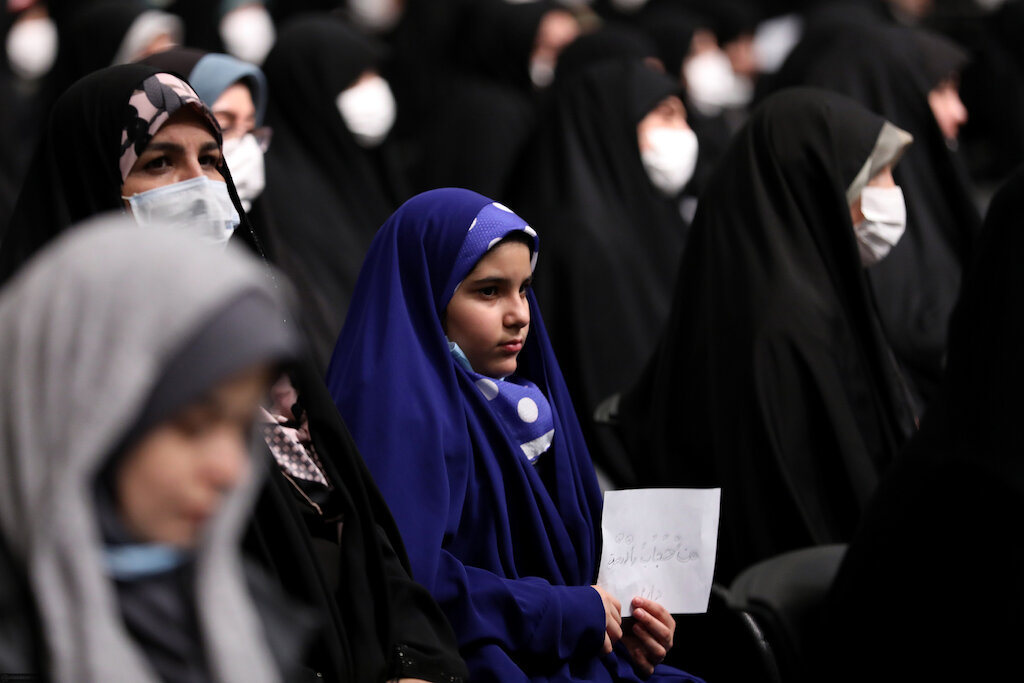
Debates and discussions around women in Islam have received significant attention for some time. Both in the Qur’an and in the Sunnah (the sayings of the Prophet Muhammad), there is great concern regarding women and their role in society, the family, and religion. Some people might be surprised, but they will find that Islam respects women and gives them the honor, dignity, and rights that enable them to achieve equality with men. However, like in all societies, women have distinctive responsibilities as wives and mothers which Islam takes into account. Islam bestows on women’s rights to participate in family and social life. This blog post is very important to discuss the role of women in Islam.
1. Women’s and Men’s Spiritual Equality
One of the core principles that Islam stands for men and women are spiritually equal. The Qur’an makes it very clear that both men and women have been created out of one single body. Hence, all have equal access to drawing closer to Allah.
In verse 35 of Chapter 33 of the Qur’an, called Surah Al-Ahzab, both genders are mentioned in the same sentence. While emphasizing that both are equally capable of fulfilling the prerequisites of faith.
“Indeed, the Muslim men and Muslim women, the believing men and believing women, the obedient men and obedient women…”
This verse demonstrates the essential immaterial duties. It underpins the religion of Islam for both males and females are equal. Both genders are enjoined in the Qur’an to attempt to do good, to do virtuous acts, to acquire knowledge, and to participate in charitable activities.
2. Rights and Protections Granted to Women
Long before it was socially acceptable, Islam recognized the woman’s rights and dignity. All parts of the world have seen women being subjugated at some point. During such a time, Islam through the Qur’an and the teachings of Prophet Muhammad acknowledged the need for Women’s dignity and autonomy.
Here are some of the central pivotal rights that shows the role of women in Islam:
Right to Own Property:
Before the coming of Islam, no women in Arabia could inherit property or any wealth and were not allowed to manage their finances either. Women, thanks to the Qur’an, were permitted to manage their finances and given the right to own property and inherit it. The Qur’an has made it an obligation for women to be able to manage their finances and for suffrage in Surah An-Nisa (4:7). Qur’an establishes women’s rights to inheritance and wealth so that women can freely manage their finances.
Right to Education – The Role of Women in Islam
Islam wants all men and women to seek knowledge. Prophet Muhammad said a lesson: “Seeking knowledge is obligatory upon every Muslim, male and female.” In the annuls of such Muslim societies, women have served as outstanding educators in the field of art and so many other subjects. Mostly females are taking part in research and writing such as medicine science, and literature.
Rights To Marriage And Divorce:
Women have the right to choose their husbands. In Islam, contracting a marriage is a mutual agreement based on consent. Women can initiate divorce proceedings, if necessary, and under certain conditions such as abandonment or abuse, without enduring harmful situations.
Rights To Work:
Islam allows women to work as the Qur’an encourages her contribution to society. This was already set by the example of the Prophet Muhammad’s first wife Khadijah who was a businesswoman.
3. Women’s Contribution Within the Family
Women form the core of the family unit. Women hold great respect and honor as mothers and wives. Islam acknowledges the hard work and effort put into raising children and maintaining a home. It was reported that the Prophet Muhammad said, “Paradise lies under the feet of mothers”.
The responsibilities of women in the family as mothers are of utmost importance. In Islam, mothers have importance and status residing in the Qur’an. Motherhood comes with emotional and physical strain.
The importance of marriage is also given special attention, mutual respect, and understanding between husband and wife. And in Surah Ar-Rum (30:21) the Holy Quran defines marriage as one of the bounties of Allah and so the connection between husband and wife must be upheld with mutual support and respect.
4. Women in Public Life and Society: The Role of Women in Islam
There is no doubt that Islam gives the privilege of participating in different aspects of public affairs such as social, political, and economic. Islam gave women according to the teachings of Islam history to take part in the political and social changes. For instance, Aisha the wife of Muhammad was a political figure along with a scholar and teacher. She and Her students continue to this day to cherish her for the lectures.
The Era of The Prophet Muhammad also included women partaking in battles, giving counsel to the caliphate, as well as having other civic duties. In modern Muslim societies, women are active in every aspect of life as well as in politics, education, medicine, and even in the business world. The Qur’an and the teachings of the Prophet encourage women to be active in developmental works.
5. Modesty and the Concept of Hijab
One of the most talked about issues of Islamic women is modesty, especially about clothing. The Qur’an and Sunnah recommend that males and females should dress in a certain way. The Qur’an instructs women to conceal their beauty and adornments as well as dress decently.
The hijab is balanced as an external symbol and a part of Islam. It encourages modesty in behavior, speech, and interaction between the sexes. The scope of modesty in Islam goes beyond that of clothing; it includes the actions and character of a woman.
6. Gender Equality in Islam
Men and women have defined responsibilities in Islamic teaching, but this division is not an indication of inequality. Islam is a religion that balances the rights of both women and men. The Qur’an gives gender equality supreme importance. The Qur’an in Surah Al-Hujurat (49:13) proclaims:
“Oh mankind, indeed We have created you from male and female and made you peoples and tribes that you may know one another. Indeed, the most noble of you in the sight of Allah is the most righteous of you.”
This quotation proves that Islam, in essence, understands gender differences. God’s sight is the only measure that gives value to humanity which is moderation and piety.
Conclusion
Islam is well-known for upholding the role of women in Islam. A Muslim wife is praised for her unique contributions to family life, society, and religion. It allows her to grow personally, receive education, and even take part in public activities. In turn, the benefits of Islamic teachings allow men and women to respect and socialize with one another. The deep-rooted Islamic values and practices strongly support the treatment given to women concerning marriage, motherhood, and overall social life.
FAQs
What are the roles of women in Islam?
Within the framework of Islam, women are equally valuable as men and are treated with dignity and respect. Furthermore, women possess the following rights: owning property, inheriting wealth, pursuing an education.
How does Islam perceive the role of women in society?
Now, that varies from one culture to another. Generally, though, Islam is supportive of women’s active participation in their relevant society. They have played key roles in the development of education, health care, and even political services. Islam encourages women’s involvement in public life as long as it does not confront principles of modesty.
What does wearing a hijab mean in Islam?
In Islam, the hijab, also called a headscarf, is a mark of modesty. It is a manifestation of a woman’s decision to dress modestly and preserve her dignity. Not as an act of oppression. Modesty concerning garments as well as manners is enjoined upon men and women equally in Islam. The hijab is worn as an expression of that principle.
What role does a woman play in the family in Islam?
Women’s role in the family is very important, especially as a mother. Islam emphasizes the love and care that a mother deserves and states that جَنَّةُ تَحْتَ أَقْدَامِ الأُمَّهَاتِ, in other words, paradise lies below a mother’s feet.
Does Islam view women as equal to men?
Islam teaches that men and women, as per Islam, are equal, and have the same position and value in the sight of Allah. Women have the same opportunities to achieve piety, righteousness, and closeness to Allah. There are some differences in the life aspects that men and women undertake.
